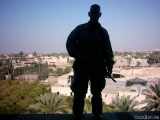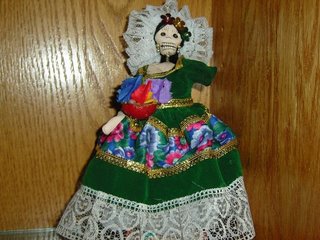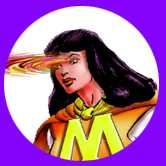I had to post this. My nephew is a Marine in Iraq and every day I worry about him and his warrior comrades who are put in harms way by those in power in the White House for this stupid senseless politicized war... "War Ends Silently for One American Soldier

By
DEXTER FILKINSPublished: June 29, 2006 (The New York Times)
RAMADI,
Iraq, June 28 — A soldier was dead, and it was time for him to go home.
The doors to the little morgue swung open, and six soldiers stepped outside carrying a long black bag zippered at the top.
About 60 soldiers were waiting to say goodbye. They had gathered in the sand outside this morgue at Camp Ramadi, an Army base in Anbar Province, now the most lethal of Iraqi places.
Inside the bag was Sgt. Terry Michael Lisk, 26, of Zion, Ill., killed a few hours before.
In the darkness, the bag was barely visible. A line of blue chemical lights marked the way to the landing strip not far away.
Everyone saluted, even the wounded man on a stretcher. No one said a word.
Sergeant Lisk had been standing near an intersection in downtown Ramadi on Monday morning when a 120-millimeter mortar shell, fired by guerrillas, landed about 30 paces away. The exploding shell flung a chunk of steel into the right side of his chest just beneath his arm. He stopped breathing and died a few minutes later.
The pallbearers lifted Sergeant Lisk into the back of an ambulance, a truck marked by a large red cross, and fell in with the others walking silently behind it as it crept through the sand toward the landing zone. The blue lights showed the way.
From a distance came the sound of a helicopter.
Death comes often to the soldiers and marines who are fighting in Anbar Province, which is roughly the size of Louisiana and is the most intractable region in Iraq. Almost every day, an American soldier is killed somewhere in Anbar — in Ramadi, in Haditha, in Falluja, by a sniper, by a roadside bomb, or as with Sergeant Lisk, by a mortar shell. In the first 27 days of June, 27 soldiers and marines were killed here. In small ways, the military tries to ensure that individual soldiers like Sergeant Lisk are not forgotten in the plenitude of death.
One way is to say goodbye to the body of a fallen comrade as it leaves for the United States. Here in Anbar, American bodies are taken first by helicopter to Camp Anaconda, the big logistical base north of Baghdad, and then on to the United States. Most helicopter traffic in Anbar, for security reasons, takes place at night. Hence the darkness.
In the minutes after the mortar shell exploded, everyone hoped that Sergeant Lisk would live. Although he was not breathing, the medics got to him right away, and the hospital was not far.
"What's his name?" asked Col. Sean MacFarland, the commander of the 4,000-soldier First Brigade.
"Lisk, sir," someone replied.
"If he can be saved, they'll save him," said Colonel MacFarland, who had been only a few yards away in an armored personnel carrier when the mortar shell landed.
About 10 minutes later, the word came.
"He's dead," Colonel MacFarland said.
Whenever a soldier dies, in Iraq or anywhere else, a wave of uneasiness — fear, revulsion, guilt, sadness — ripples through the survivors. It could be felt on Monday, even when the fighting was still going on.
"He was my best friend," Specialist Allan Sammons said, his lower lip shaking. "That's all I can say. I'm kind of shaken up."
Another soldier asked, "You want to take a break?"
Specialist Sammons said, "I'll be fine," his lip still shaking.
Sergeant Lisk's friends and superiors recalled a man who had risen from a hard childhood to become someone whom they counted on for cheer in a grim and uncertain place.
"He was a special kid," Specialist Sammons said. "He came from a broken home. I think he was divorced. I'm worried that it might be hard to find someone."
He said he would write a letter to the family — to whom it was not clear just yet.
Hours later, at the landing zone at Camp Ramadi, the helicopter descended. Without lights, in the darkness, it was just a grayish glow. With its engines still whirring, it lowered its back door.
The six soldiers walked out to the chopper and lifted Sergeant Lisk's body into it. The door went back up. The helicopter flew away.
The soldiers saluted a final time.
In the darkness, as the sound of the helicopter faded, Colonel MacFarland addressed his soldiers.
"I don't know if this war is worth the life of Terry Lisk, or 10 soldiers, or 2,500 soldiers like him," Colonel MacFarland told his forces. "What I do know is that he did not die alone. He was surrounded by friends.
"A Greek philosopher said that only the dead have seen the end of war," the colonel said. "Only Terry Lisk has seen the end of this war."
The soldiers turned and walked back to their barracks in the darkness.
No one said a word.









